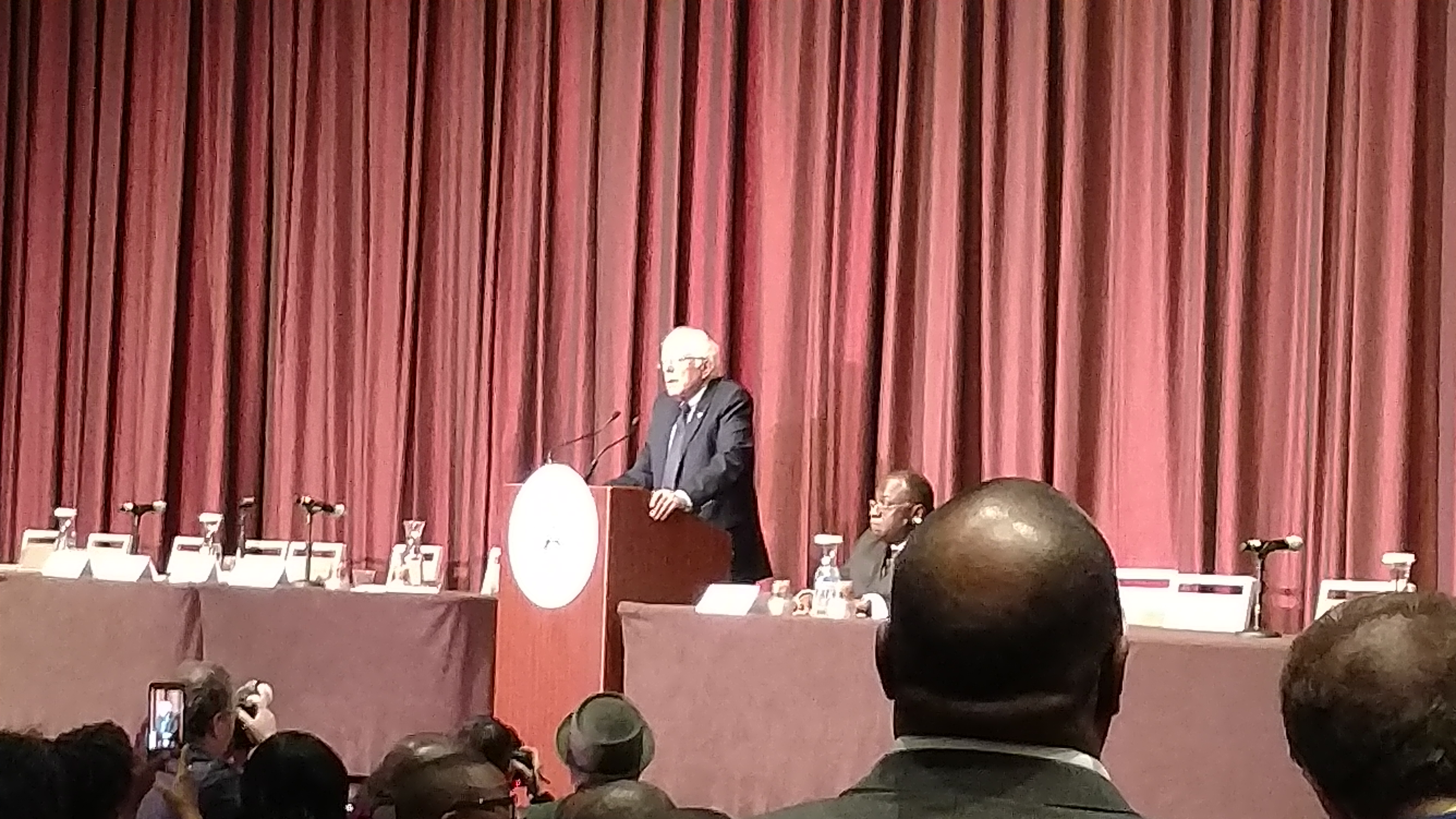
Coming after a night drawing tens of thousands to Washington Square Park in the heart of New York University’s Greenwich Village campus, Senator Bernie Sanders took on an audience at the National Action Network’s annual convention on Thursday. His appearance came the day after Hillary Clinton spoke to the convention attendees and, according to reports in The New York Times, received a lukewarm response from the audience. For Sanders, the speech before the group founded by civil rights activist Rev. Al Sharpton offered another opportunity to connect with the African-American community.
Sanders, while racking up significant victories in Democratic primaries and caucuses, has struggled getting his message across to Black voters. New York represents an opportunity for him to make inroads in the Black community, and do so in the state in which Senator Clinton has served and has high name recognition. In the last week Sanders has made multiple appearances in the Big Apple and drawing sizeable crowds. His efforts seem to be paying off as he has cut into the once sizeable lead of Clinton, with most polls putting him only 10 percentage points behind the former secretary of state. The latest Reuters/Ipsos poll has Sanders and Clinton tied among Democratic voters nationally and reveals the lack of support for Clinton among voters in the 18-34 year-old voting bloc.
Rev. Sharpton introduced Senator Sanders to the audience packed in the ballroom of the Sheraton in midtown Manhattan. The Vermont senator wasted little time in getting to the “truth,” as he described his take on conditions that he deemed unacceptable in America in 2016. He immediately went to his litany of popular themes; income inequality, the control of the nation’s politics by the “1%,” the corruption of campaign finance system, the need for universal health care, and his call for free admission to public colleges and universities. Upon each topic he covered, there were expressions of support from audience members as more than once “You tell ‘em Bernie!” and “Tell it Bernie!” punctuated the air in the room.
What Sanders offered up to this audience that differed from his normal stump speech was a focus on civil rights issues. Sanders evoked the civil rights movement and Dr. Martin Luther King, Jr., and recalled being present at the 1963 March on Washington. He reminded the audience that the march’s theme was “Jobs and Freedom” and suggested that the nation had fallen far short of those goals. Senator Sanders chastised Republican governors for passing laws to suppress Black voters and referenced efforts such as Voter ID laws. He also touched upon the criminal justice system and alluded to the Clinton [President Clinton] crime bill that has recently become a lightning rod on the campaign trail. Sanders used the example of marijuana to demonstrate the racial disparity in criminal penalties imposed when a conviction for the use of the drug is made. The Vermont senator pledged to eliminate such disparities and to approach drug use as a health condition and not a criminal act.
At one point during the speech, to validate that his concern for civil rights was not new, Sanders pointed out Rev. Jesse Jackson in the audience and recalled how he backed Jackson’s 1988 presidential bid over the objection of the Democratic party establishment in Vermont.
One of the parts of Sander’s speech that elicited the strongest positive reaction was when he referenced the need to invest in the nation’s infrastructure and used the Flint Michigan lead contaminated water crisis as an example of the nation’s failure to support cities. He called for the infusion of federal dollars in a jobs program to put the unemployed back to work and rebuild the crumbling infrastructure across the nation. Sanders repeatedly referenced the city of Detroit as an example of the nation’s failed urban policy and the damage done to cities by the export of jobs overseas. It was a point that resonated with the audience and drew supportive cheers from many in the ballroom.
If nothing else, Sanders appearance before the National Action Network confirms that his message resonates with Black voters who get an opportunity to hear it. More so than even Barack Obama in 2008, Senator Sanders has grassroots momentum that is being propelled by young people across racial and class lines, and small donor fundraising that is outpacing the Clinton’s vaunted campaign finance operation. Sanders also has a significant edge in enthusiasm, as was evident in the difference in the audience reaction to each candidate over the last two days. Upon the conclusion of his speech, the audience erupted in chants of “Bernie!” as the candidate was mobbed by photographers and supporters on the floor of the ballroom.
With the primary around the corner that was once a lock for Hillary Clinton, given her representation of New York in the U.S. Senate; the race is now competitive and Sanders likely does not need a victory to stay in the race until the convention this summer. If he comes within 10-12 points of Clinton, in her adopted home state, he will accentuate the negatives attached to her candidacy and continue to raise money at an unprecedented level. And if he picks up greater Black support, he will expose the vulnerability of his opponent.

today in black history
July 26, 2024
The Republic of Liberia, founded by the American Colonization Society to resettle freed African slaves, gains independence in 1847.
Sanders lights up New York audience
POSTED: April 15, 2016, 9:00 am






















